Your cart is currently empty!
Differential Pressure Gauges
$33.00 – $59.00
Liquid-filled differential pressure gauges are critical components for accurate pressure measurement in various industrial applications. These gauges are designed with a specialized liquid fill, such as glycerin or silicone oil, which dampens pressure fluctuations and vibrations, ensuring stable and precise readings. Their design minimizes wear on internal components, enhancing durability and longevity, making them ideal for situations where rapid pressure changes are common.
In addition to improving accuracy in pressure measurement, the liquid filling reduces needle oscillations and glare on the gauge face, making it easier to read in diverse lighting conditions. Available in different mounting configurations including bottom, back, and panel mounts, these gauges offer flexibility and ease of use in various systems. Resilient and adaptable, they are suitable for harsh environments, including exposure to extreme temperatures and chemicals.
Liquid-filled differential pressure gauges are widely used in whole-house filtration systems, industrial machinery, and hydraulic systems, providing vital support for maintaining optimal performance and operational efficiency. Their stability, durability, and precise measurements make them an indispensable tool for critical pressure monitoring in a wide range of applications.
- Description
- Additional information
- Sepcifications
- Replacement Parts
- Q&A
- Advantages / Disadvantages
- Applications
- Downloads
- Drawings
- Reviews (0)
Description
Liquid-filled differential pressure gauges are versatile and vital instruments used in various industrial, commercial, and residential settings. In addition, differential pressure gauges play a crucial role in measuring and monitoring pressure differentials. This aids in the efficient functioning of complex systems such as filtration, hydraulics, and pneumatics.
The primary design feature of a liquid-filled differential pressure gauge lies in its utilization of a specialized liquid fill (often glycerin or silicone oil) to dampen pressure fluctuations and vibrations, providing stable and accurate pressure readings. This design ensures that the gauge is suitable for environments where rapid or erratic pressure changes are common, making it an ideal choice for demanding applications. One of the significant advantages of a liquid-filled differential pressure gauge is its ability to minimize wear and tear on internal components when subjected to high vibrations or sudden pressure spikes.
The presence of the liquid fill ensures that the gauge mechanism remains stable and reliable. It will also prolong its operational lifespan and reduce the need for frequent maintenance. The liquid filling within the gauge not only enhances its durability but also contributes to improved accuracy in pressure measurement. Also, by reducing needle oscillations and transient pressure changes, the gauge provides precise and consistent readings. Because of its consistency, it makes it a valuable tool for critical pressure monitoring applications.
Furthermore, the use of a liquid-filled design addresses the potential issue of glare on the gauge face, commonly encountered when using dry gauges. The liquid fill effectively reduces glare, making it easier to read the gauge, even in environments with varying lighting conditions. When considering the installation and mounting options, liquid-filled differential pressure gauges are available in various configurations. This includes bottom, back, and panel mounts. The choice of mounting style depends on the specific needs of the application, ensuring flexibility and ease of use across diverse systems.
A critical aspect of liquid-filled differential pressure gauges is their resilience and adaptability in varying environmental conditions. These gauges are designed to withstand challenging environments, including exposure to extreme temperatures and harsh chemicals. This ensures reliable performance in demanding industrial settings. Liquid-filled differential pressure gauges find widespread use in whole-house water filtration systems, industrial machinery, and hydraulic systems. Also, other applications where precise pressure monitoring is essential. Their ability to accurately measure pressure differentials helps maintain optimal performance and contributes to the overall operational efficiency of complex systems.
In conclusion, the liquid-filled differential pressure gauge stands as an essential tool for various industries. Moreover, they are also essential for other systems that demand accurate pressure monitoring. Liquid-filled differential pressure gauges also provide stability, durability, and precise measurements in diverse applications. Finally, by effectively dampening pressure fluctuations and enhancing accuracy these gauges play a pivotal role. They also assist with maintenance and performance optimization of critical systems.
Additional information
| Weight | 1.25 lbs |
|---|---|
| Dimensions | 6 × 6 × 6 in |
| Size | 2", 4" |
| Mounting Type | 1/4" Bottom MNPT, 1/4" Center Back MNPT |
| Mateial | Brass, 304SS |
Sepcifications
Dial size: 2″ / 4″
Process connection: 1/4″NPT center back mount male / 1/4″NPT bottom mount male
Case: 304 stainless steel case and crimped ring
Window: Polycarbonate
Dial plate: Aluminum, with pointer stop
Pointer: Aluminum, black, DIN style
Boudon tube: Copper alloy
Movement: Brass / 304SS
Connection: Brass, one-piece design / 304SS
Oil cap: Rubber, gray color
Filling: Glycerin-filled, dampens the effect of vibration and pulsation; lubricates the movement and extends the life of the gauge.
IP class: IP67
Accuracy: +/-3-2-3%
Differential Pressure range: 0-35psi/250kpa dual scale
Color zone, blue zone for filter 0-17.5psi, red zone for clean 17.5 to 35psi
Working temperature: -4 to 140 deg F/-20 to 60 deg C
Ambient temperature: 140 deg F/60 deg C maximum
Widely Applicable: Used for water pressure, air pressure, hydraulic pressure, and oil pressure. For pressure measuring and adjustment on the filter of swimming pool, Spa, Aquarium Water, etc.
Package Dimensions: LxWxH
2.72 x 2.44 x 2.44 Inches (2″ Gauge) / 4.72 x 4.44 x 4.44 Inches (4″ Gauge)
Weight: 0.89 Pounds
Manufacturer warranty for 1 year from date of purchase. If you are confused about our product, feel free to contact us.
Replacement Parts
Q&A
Q: What is a differential pressure gauge for whole-house filtration systems?
A: A differential pressure gauge for whole-house filtration systems is a device used to measure the pressure differential between the inlet and outlet of the filtration system. This helps determine the level of clogging or blockage in the filter, indicating when maintenance or replacement is needed.
Q: How does a liquid-filled differential pressure gauge work?
A: A liquid-filled differential pressure gauge typically contains a liquid (often glycerin or silicone oil) that fills the space between the dial and the internal components. This liquid helps dampen any vibrations or pressure spikes, ensuring stable and accurate readings. As the pressure differential across the filter changes, it is transmitted to the gauge, causing the dial to display the corresponding pressure value.
Q: What are the benefits of using a differential pressure gauge in a whole-house filtration system?
A: Using a differential pressure gauge provides real-time feedback on the condition of the filtration system. It helps in proactive maintenance, as it allows users to monitor the clogging level of the filter and schedule timely replacements or cleanings, thus ensuring optimal performance and water quality throughout the entire house.
Q: What features should I consider when selecting a differential pressure gauge for whole-house filtration?
A: When choosing a differential pressure gauge, consider factors such as compatibility with your filtration system, the range of pressure it can measure, the durability of the gauge and its resistance to water and other environmental factors, and ease of installation and reading.
Q: How often should I check the differential pressure gauge for my whole house filtration system?
A: It’s recommended to check the differential pressure gauge regularly, especially during routine maintenance of your whole house filtration system. However, the frequency of checks may vary depending on usage and the specific requirements of your filtration system. It’s best to consult the manufacturer’s guidelines for accurate information.
Q: What should I do if the differential pressure gauge indicates a high-pressure drop across the filter?
A: If the gauge indicates a significant pressure drop, it is an indication that the filter may be clogged and in need of maintenance or replacement. In such cases, it’s important to follow the manufacturer’s guidelines for servicing the filtration system and addressing the cause of the pressure drop to ensure continued efficient operation.
Advantages / Disadvantages
Here are some advantages and disadvantages of using a liquid-filled differential pressure gauge for a whole-house filtration system:
Advantages:
- Dampening of Pressure Spikes: The liquid within the gauge helps dampen sudden pressure spikes, ensuring more stable and accurate readings.
- Enhanced Durability: The presence of liquid can help protect internal components from potential damage caused by vibration, making the gauge more durable.
- Improved Accuracy: The liquid filling helps reduce needle fluctuations, resulting in more precise pressure readings.
- Reduced Wear and Tear: The damping effect of the liquid can minimize wear and tear on internal components, potentially extending the lifespan of the gauge.
- Easy to Read: The liquid filling reduces glare on the gauge face, making it easier to read in various lighting conditions.
Disadvantages:
- Temperature Sensitivity: Liquid-filled gauges may be susceptible to temperature-related expansion or contraction of the filling material, potentially affecting accuracy.
- Maintenance: The presence of liquid increases the complexity of maintenance and repair, as it requires special consideration to prevent leakage or contamination of the internal components.
- Cost: Liquid-filled gauges may be more expensive compared to their dry counterparts, adding to the overall cost of the filtration system.
- Potential Leak Risks: There is a slight risk of leakage over time, though this is mitigated by the use of high-quality seals and materials.
- Limited Use in Certain Environments: Liquid-filled gauges may not be suitable for use in extreme temperature or pressure conditions, limiting their application in certain environments.
Applications
Downloads
Drawings
Only logged in customers who have purchased this product may leave a review.



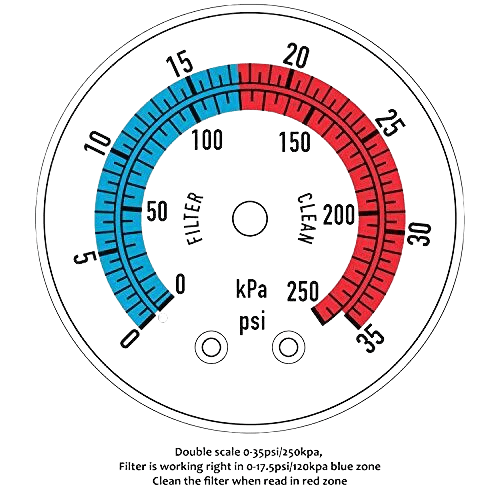




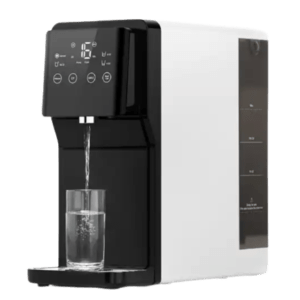
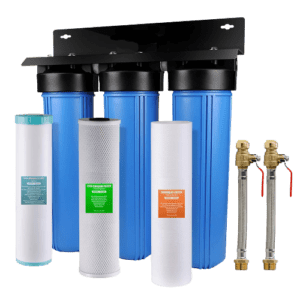
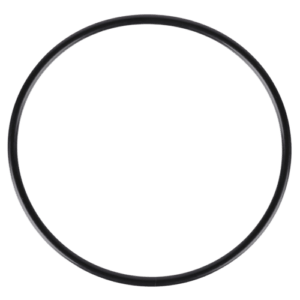
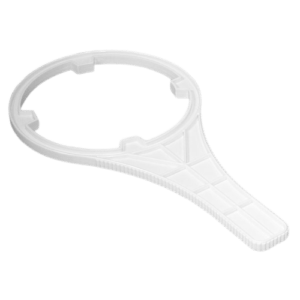
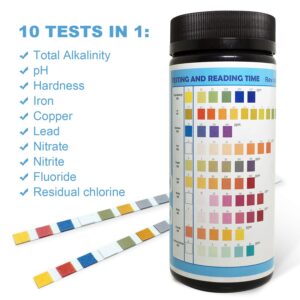
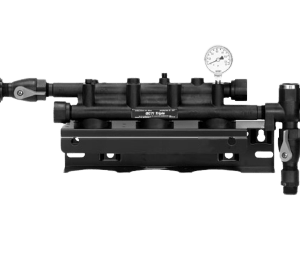
Reviews
There are no reviews yet.